Moisture content can significantly impact the efficiency of a crusher due to several reasons:
Material Clogging and Blockage: High moisture content can lead to the materials sticking together or to the walls of the crusher. This can cause clogging, leading to blockages that reduce throughput and efficiency. It can also result in more frequent shutdowns for cleaning and maintenance.
Reduced Throughput: Wet materials tend to move slower through the crusher as they clump together, diminishing the machine’s ability to process material quickly, thus lowering overall throughput.
Increased Wear and Tear: Moist materials can create more friction inside the crusher, potentially accelerating wear and tear on the equipment. This can increase maintenance costs and reduce the lifespan of components.
Inefficient Size Reduction: Crushers are designed to break down dry materials. When materials are wet, they can act like a cushion and absorb some of the energy intended to break them down, resulting in larger particle sizes and requiring additional crushing cycles.
Energy Consumption: Wet materials can make the crusher work harder since more energy is needed to apply sufficient force to crush materials that are more cohesive. This leads to increased energy consumption and operational costs.
Screening Challenges: If the material needs to be screened after being crushed, high moisture content can result in poor screening efficiency, with wet materials sticking to the screen and making it difficult to achieve desired separation.
To manage these issues, it is crucial to regulate the feed moisture content. Pre-treatment processes such as drying or the use of anti-clogging agents might be necessary to improve efficiency and maintain optimal crusher performance.
